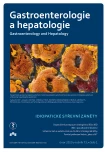-
Medical journals
- Career
Treatment of a pregnant Crohn’s disease patient with ustekinumab: a case report
Authors: Lukešová L. 1; Nedbalová L. 1; Šerclová Z. 2
Authors‘ workplace: Centrum pro biologickou léčbu nespecifických střevních zánětů, Gastroenterologie, Nemocnice Turnov, KN Liberec, a. s. 1; Chirurgické oddělení, Nemocnice Hořovice 2
Published in: Gastroent Hepatol 2019; 73(1): 43-45
Category: IBD: Case Report
doi: https://doi.org/10.14735/amgh201943Overview
The balance between maintenance of remission and safety is important when treating idiopathic inflammatory bowel disease in pregnancy. Conception and pregnancy should be planned for the period of remission, and the therapeutic strategy leading to remission should be maintained during pregnancy and nursing. The drugs used to treat idiopathic bowel disease are relatively safe in pregnancy, except for methotrexate. A large amount of data indicate that anti-tumor necrosis factor α (TNFα) therapy in pregnancy is safe for both the mother and child. The risks of an increased infection rate, allergies, and immunodeficiencies in children of mothers who receive anti-TNFα therapy during pregnancy have not been confirmed. There is only limited experience of the use of ustekinumab in pregnancy. Although there are case reports of dermatology patients who received ustekinumab in pregnancy, the doses used in these patients are lower than those used to treat Crohn’s disease (CD). We report a CD patient who achieved clinical and laboratory remission and partial mucosal healing upon ustekinumab therapy. This effect was maintained by continuous therapy throughout pregnancy. The patient had a cesarean section at week 38 of gestation. Her daughter is healthy and continues to prosper.
Key words:
inflammatory bowel disease – anti-TNFα – infliximab – adalimumab – ustekinumab – gravidity – Crohn’s disease – biologic therapy
Submitted: 5. 2. 2019
Accepted: 10. 2. 2019
The authors declare they have no potential conflicts of interest concerning drugs, products, or services used in the study.
The Editorial Board declares that the manuscript met the ICMJE „uniform requirements“ for biomedical papers.
Sources
1. Vermeire S, Carbonnel F, Coulie PG et al. Management of inflammatory bowel disease in pregnancy. J Crohns Colitis 2012; 6(8): 811−823. doi: doi: 10.1016/ j.crohns.2012.04.009.
2. van der Woude CJ, Ardizzone S, Bengtson MB et al. The second European evidencedbased consensus on reproduction and pregnancy in inflammatory bowel disease. J Crohns Colitis 2015; 9(2): 107−124. doi: 10.1093/ ecco-jcc/ jju006.
3. Damas OM, Deshpande AR, Avalos DJ et al. Treating inflammatory bowel disease in pregnancy: the issues we face today. J Crohns Colitis 2015; 9(10): 928−936. doi: 10.1093/ ecco-jcc/ jjv118.
4. Glover LE, Fennimore B, Wingfield M. Inflammatory bowel disease: influence and implications in reproduction. Inflamm Bowel Dis 2016; 22(11): 2724– 2732. doi: 10.1097/ MIB.0000000000000884.
5. Bortlik M, Duricova D, Machkova N et al. Impact of anti-tumor necrosis factor alpha antibodies administered to pregnant women with inflammatory bowel disease on long-term outcome of exposed children. Inflamm Bowel Dis 2014; 20(3): 495– 501. doi: 10.1097/ 01.MIB. 0000440984.86659.4f.
6. Mahadevan U, Martin CF, Sandler RS et al. PIANO: A 1000 patient prospective registry of pregnancy outcomes in women with IBD exposed to immunomodulators and biologic therapy. Gastroenetol 2012: S149. [online]. Available from: https:/ / www.gastrojournal.org/ article/ S0016-5085(12)60561-7/ pdf.
7. SPC LP Stelara. [online]. Dostupné z: https:/ / www.ema.europa.eu/ documents/ product-information/ stelara-epar-product-information_cs.pdf.
8. Galluzzo M, D’Adamio S, Bianchi L. Psoriasis in pregnancy: case series and literature review of data concerning exposure during pregnancy to ustekinumab. J Dermatolog Treat 2018 : 1– 5. doi: 10.1080/ 09546634.2018.1468066.
9. Scherl E, Jacobstein D, Murphy C et al. A109 pregnancy outcomes in women exposedto ustekinumab in the Crohn’s disease clinical development program. J Can Assoc Gastroenterol 2018; 1 (Suppl 2): 166. doi: 10.1093/ jcag/ gwy009.109.
10. Cortes X, Borrás-Blasco J, Antequera B et al. J Clin Pharm Ther 2017; 42(2): 234– 236. doi: 10.1111/ jcpt.12492.
11. Rowan CR, Cullen G, Mulcahy HE et al. Ustekinumab drug levels in maternal and cord blood in a woman with Crohn‘s disease treated until 33 weeks of gestation. J Crohns Colitis 2018; 12(3): 376– 378. doi: 10.1093/ ecco-jcc/ jjx141.
12. Klenske E, Osaba L, Nagore D et al. Drug levels in the maternal serum, cord blood and breast milk of a ustekinumab-treated patient with Crohn‘s disease. J Crohns Colitis 2019; 13(2): 267– 269. doi: 10.1093/ ecco-jcc/ jjy153.
13. Matro R, Martin CF, Wolf D et al. Exposure concentrations of infants breastfed by women receiving biologic therapies for inflammatory bowel diseases and effects of breastfeeding on infections and development. Gastroenterology 2018; 155(3): 696– 704. doi: 10.1053/ j.gastro.2018.05.040.
Labels
Paediatric gastroenterology Gastroenterology and hepatology Surgery
Article was published inGastroenterology and Hepatology

2019 Issue 1-
All articles in this issue
- News in 2019
- Biologics for inflammatory bowel disease – forth time
- Inflammatory bowel disease and medical assessment service
- Treatment of a pregnant Crohn’s disease patient with ustekinumab: a case report
- Surprising etiology of terminal common bile duct stricture
- Therapeutic trial of proton pump inhibitors for management of patients with laryngopharyngeal reflux
- Does abdominal compression improve the success rate of and tolerance to colonoscopy?
- Toxic and drug damage of the liver and kidneys
- The selection from international journals
- Clensia® – the first combined cleansing agent with simeticone
- Vedolizumab vs. ustekinumab as second-line therapy in Crohn’s disease in clinical practice
- Early vedolizumab trough levels are not associated with short-term response in patients with inflammatory bowel disease
- Ileocaecal Crohn’s disease and familial adenomatous polyposis in one patient – a case report
- First European Conference of Young Gastroenterologists – ECYG
- Gastroenterology and Hepatology
- Journal archive
- Current issue
- Online only
- About the journal
Most read in this issue- Clensia® – the first combined cleansing agent with simeticone
- Toxic and drug damage of the liver and kidneys
- Surprising etiology of terminal common bile duct stricture
- Therapeutic trial of proton pump inhibitors for management of patients with laryngopharyngeal reflux
Login#ADS_BOTTOM_SCRIPTS#Forgotten passwordEnter the email address that you registered with. We will send you instructions on how to set a new password.
- Career

